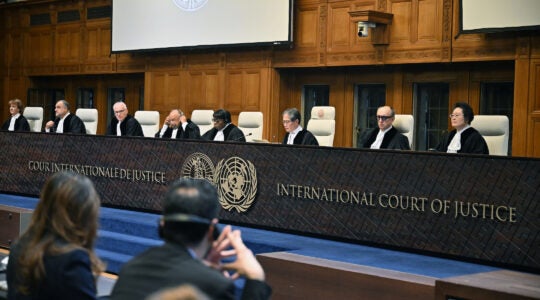JERUSALEM (JTA) — “It’s Hard to Say Goodbye If You Won’t Leave” was the title of an old episode of “Frasier.”
It could also describe the latest chapter in a coalition crisis that threatens to bring down Benjamin Netanyahu’s government.
The Israeli prime minister narrowly avoided having to call snap elections after, in a surprise turnaround, Education Minister Naftali Bennett announced that he would stand behind Netanyahu.
Bennett, head of the Jewish Home party, a member of the government coalition, threatened last week to leave the government and take his eight right-wing Knesset seats with him. He was demanding to be named defense minister, replacing Avigdor Liberman, who resigned over differences about how to deal with Gaza.
Liberman and his five lawmakers left the government on Wednesday, leaving Netanyahu with the narrowest of Knesset majorities, 61 seats in the 120-seat Parliament.
At least three ministers had called for early elections to be held as soon as possible. Interior Minister Arye Deri of the Sephardic Orthodox Shas party backed down on Sunday, and Bennett followed suit the next day. Netanyahu and Finance Minister Moshe Kahlon, head of the Kulanu party, which holds 10 seats in the current government, met Sunday prior to the prime minister’s announcement and are scheduled to meet again in the next couple of days.
Netanyahu met over the weekend with the heads of the parties in his government, including Bennett, in an effort to preserve the coalition. On Sunday, a visibly agitated Netanyahu announced in a televised broadcast that he would personally assume the defense minister position, saying that “I have a clear plan. I know what to do and when to do it. And we will do it.”
Netanyahu is currently in charge of the foreign affairs, defense, health and immigration absorption ministries. An unnamed senior government official told the Israeli media that he soon would appoint a foreign minister in an attempt to court allies.
The prime minister called on his coalition partners to remain in the government, predicting that it could lead to the same type of government that arose after the fall of his Likud government in 1992 “that gave us the disastrous Oslo Accords.”
“In times like these, you do not overthrow a government. It’s irresponsible,” Netanyahu said. “We have another full year until elections. We are in an intensifying battle, and in the middle of a battle we don’t abandon our posts. In the middle of a battle we do not play politics. The security of the nation is beyond politics, and the security of the nation is also beyond personal concerns.”
Bennett responded to Netanyahu in his announcement on Sunday morning.
“If the prime minister is serious in his intentions,” he said, “I am saying now: We are removing all political demands and standing here to help Israel win again. It’s better that Netanyahu beat me in politics than [Hamas leader Ismail] Haniyeh beat Israel in the battlefield.”
Bennett was joined by Justice Minister Ayelet Shaked, the No. 2 in Jewish Home.
Shortly before the Bennett news conference from the Knesset, Netanyahu met with the Knesset Foreign Affairs and Defense Committee. He told its members that he had already met in his new position as defense minister with the Israeli army’s chief of staff, Lt.-Gen. Gadi Eizenkot, and his designated successor, Maj.-Gen. Aviv Kochavi.
“We are in a campaign that has not yet ended,” Netanyahu told the committee. “At this sensitive security time, it would be irresponsible to topple the government. Whether our partners decide to topple the government or not, we will continue to take action to ensure the security of our state and of our people. We will do so sensibly, responsibly and with determination.”
The government’s four-year term ends in November 2019. Elections are called early if a government ruling coalition falls apart, usually over a crisis, such as the recent Gaza flare-up. Ten of the 20 governments since the founding of the state have dissolved and moved to early elections. Recent governments have not served out their full terms. The last election was in 2015; the one before that was in 2013.
JTA has documented Jewish history in real-time for over a century. Keep our journalism strong by joining us in supporting independent, award-winning reporting.






